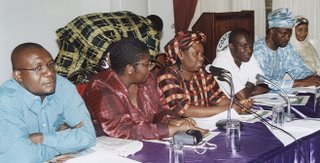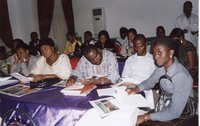azuah's abuja reading
Isaac Ogezi and I drove from Keffi. He consistently pressed on me a sense of punctuality because he didn’t want us to arrive a minute late and, especially, because Unoma is a writer we have always discussed and have considered our friend because of her kind gesture of sending us her novel when it was just a few days old. We arrived at Reinz Continental Hotel at about four-forty in the evening. Inside the flamboyant hotel reception, bespectacled Ahmed Maiwada, incurable participant of every ANA-Abuja’s activity, greeted us cheerfully. I quickly introduced Isaac to him because I knew they had been friends without meeting each other. Ahmed would rush to his office to pick a copy of Wole Soyinka’s From Zia, With Love he bought as a gift for Isaac, but the latter told him not to bother, that he would collect it another day.
The question held behind my teeth with patience, as Isaac and Ahmed conversed, burst out, "Is Unoma around?" Ahmed replied: "Yes, she is around, but not in the hall now; Emman Shehu is there." Isaac and I went into the hall and there was the big brother [Shehu], cheerful as ever; and standing with him was a tall smiling figure he introduced as Chukwu Eke.
After greetings here and there, we settled down. People kept coming into the hall and I steadied my gaze on the door to see if I could catch Unoma’s face. Her image from the backcover of her novel was getting increasingly sharper on my mind. The programme began without the usual introduction of one standing up to introduce himself/herself; I guess big brother had cleverly edited it out to present Unoma to us as a surprise. Along with others, I was called to the "high table" and my seat was adjacent to the guest reader’s from the left. I was surely taken by surprise when the creator of Ofunne was called to take her seat: the lady I had pinned my eyes on turned out not to be Unoma! A gentle-looking and smiling lady in a simple long wear and headscarf, looking almost matronly, walked gracefully forward and took her seat beside me. I still had to ask, "So you are Unoma" as I shook her hand. And she beamed me a smile and asked if I was Sule and gave me a knowing hug. She would later ask of Isaac. Too, Chinyere Obi-Obasi who was on the high table and had seen Unoma’s picture didn’t believe her eyes. Apart from the writerly simplicity, Unoma looked more humble and quieter than we thought she would be.
Unoma Azuah is flanked by (L-R) Chukwu Eke, Chinyere Obi-Obasi, Emman Egya Sule, Asimiafele & Hajia Fika.
Big brother MCied the occasion himself; he always does. Aigbokhoaode Asimiafele, chairman of ANA-Abuja think-tank Committee, an elderly man, also on the high table, opened the reading as he read his poem, written in the US like Unoma’s novel. This set the tone of Americanism (I am talking about the racism so-and-so) that would pervade the entire occasion. Then big brother, as a way of introducing the novel to the audience, read a eulogising review of Sky-High Flames by one Christy Williams of the Department of English, University of Hawaii, Honolulu. It was while he was reading that Jerry Agada, ANA’s Vice President, walked in and gave the occasion a national presence. I had all along been wondering where Denja Abdullahi, ANA national secretary, whose presence had always been generous to such occasions in and outside Abuja, was at this time.
Unoma, before reading, apologised that she could not provide copies of the novel because she had been hoodwinked into thinking that copies of the book, which she sent earlier, were available in Nigeria until she came and discovered it was not so. Chinyere had her copy of the novel and it was passed round for everyone to look at. Unoma began her reading in her soft, feminine voice, going through four extracts in such a progression that gave the audience the beginning, the middle and the end of the novel. It was pleasant listening to her reading out the life of Ofunne.
Time for questions and contributions brought out the elation in the audience. Even though a lot of them had not read the novel, and did not have the novels in their hands to follow Unoma’s reading, they asked such intelligent questions about the novel, Unoma’s life, writing and publishing in the United States that made the reading a success.
A lady was interested in knowing whether the story of Ofunne was a fact or fiction. Unoma said although her work was fiction, she had, like most writers, drawn from realities in life. The story, she said, was based on the true-life story of her aunt who, though brilliant and vivacious, was condemned to early marriage that took her life. Isaac ended his contribution, centred on the weakness of Ofunne’s character, by asking Unoma whether she had done research enough to know that syphilis was capable of making one infertile as she had shown in her story. The audience answered for Unoma. Yes, syphilis can destroy the seed in a man or woman.
Ahmed said he had read Unoma’s poetry and thought she was a good "poetess" (Unoma rejected that appellation because of its anti-feministic complexion and we helped her get Ahmed to alter it to "poet"), probably better than a fictionist, and that he expected that she should have published a volume of poetry by now. He also expected a poetic dinner from her that evening. A collection of poems, in limited copies, had been published long ago, Unoma said; she promised to send Ahmed a copy.
A guy was interested in knowing how easy it was to find a publisher in the US and whether one, with his money, could self-publish or not. Unoma answered that it was not easy to find a publisher interested in an African story in America. Out of the about one hundred and twenty publishers she scouted on the Internet, only three were interested in her manuscript. If she hadn’t found a publisher, she wouldn’t have self-published because, apart from the relegation of self-publishing to vanity press, she didn’t have the money to do that. And as a response to Chinyere’s question bothering on editing and reworking, Unoma said she had it tough because her editors kept wanting her to remove something or add something. In fact, the Sister Dolan-Ofunne relationship in the missionary school was elaborated as her publisher’s idea of emphasising the role of the missionary (who are, of course, the white people) in moulding the character of a young black woman.
For Patrick Oguiejiofor, that protagonist of Okigboism, to what extent was Unoma’s pocket fattened by the publishing and marketing of her novel in America. Was she given any advance payment? Unoma said she was given an advance payment but refused to disclose the amount. She also told us how her royalty was worked out.
When it was my turn, I expressed my worry about the paradigm of the woman telling (always) the woman’s story. When will Nigerian women writers tell other stories other than the woman’s story? A concomitant question is, when will Nigerian literature move from the preoccupations of the present to the fantasies of the future as Charles E. Nnolim has advised in one of his recent essays? Unoma’s response was that the woman will stop telling the woman’s story when women are fully emancipated from the subjugation of men in our society.
It was Chukwu, that amiable fellow who descended from the hills of Enugu to Abuja to witness, according to him, the innovation of Emman Shehu-led exco, who sent the hall reverberating in laughter. He took a good look at Ahmed and told us that he (Ahmed) was a good example of the kind of madman a writer should be. Ahmed denied it amidst guffaws. Then Chukwu took his time to convince us that all writers were mad people and unless a person chose to be a deviant in the society, he could not be a good writer. After presenting himself to us as the writerly madman, he made two important points about writing and publishing. First, he said we should de-emphasise the problems of publishing in Nigeria and strive to attain excellence in writing. Publishing works is not the issue, but the issue is how qualitative are the works. A young writer should keep working hard on a manuscript until it is worthy of being a great work before he approaches the problems of publishing. Second, Chukwu warned that we should be careful about denigrating self-publishing, especially in Nigeria. He contextualised his warning in the story of his friend who sneered at self-publishing in Nigeria, took a long jump into America, thinking that he would find a publisher that would make him a Chimamanda. After going round the US without finding a single publisher interested in his manuscript, he returned to Nigeria, wretched, and alas! he self-published the manuscript with the worst printer in Nigeria.
After taking that dose of humour from Chukwu, we took an Abuja Literary Society announcement from Ken Ike before we settled for a light refreshment of tea, coffee, chicken, cake and club sandwich during which we chatted freely, hugging and handshaking one another. Unoma, the celebrity of the day, was crowded, had snapshots with people and we were all sad that she didn’t have copies of her novel to autograph for those who didn’t have. Ahmed, now going versatile, introduced a Nupe film he produced along with ANA-Niger actors to me. He autographed a copy for me. I trapped Ifeoma Chinwuba, author of Merchant of Flesh, in a brief feministic chat. Chinyere introduced me to her unwriterly gentleman of a husband and thereafter engaged me in jokes. She is a well of jokes and laughter. A section of the audience...
A section of the audience...
Since everything that has a beginning must have an end; since every delicious dinner will certainly finish, we all reached that moment where the best thing to say was to bid one another goodbye. Unoma herself accompanied some people to the hotel gate since she stayed in the same hotel. We went into the cold arms of the night, ready for sound sleep.



<< Home